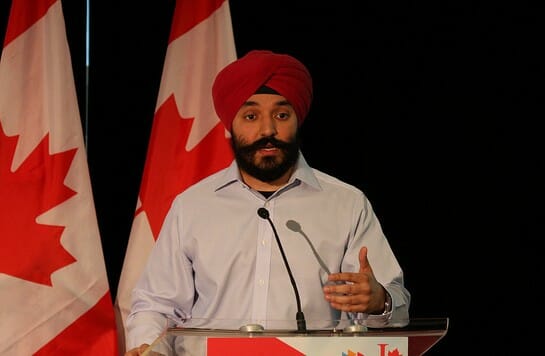Beware Stephen Harper’s crusade against unfamiliar clothing
March 25, 2015

A few years back I attended the annual Robbie Burns supper on Parliament Hill. The event was a welcome opportunity for all MPs to do something collegial while celebrating Scottish heritage. To make the event memorable I decided to go in full Highland dress, a kilt and all. Peter MacKay and I presented the haggis and we all enjoyed the poetry of that great Scottish bard.
I learned about a culture different than my own but one inextricably linked to our wider Canadian identity. This is the Canada I know, this is the Canada I want to preserve.
The reaction to my tartan attire, which was once banned by the Dress Act of 1746 in an attempt to suppress the Scottish culture, was one of great amusement as I was, naturally, also sporting a turban. My children enjoy the pictures to this day. To me that image is also a fun encapsulation of our shared mosaic: distinct cultures coming together to create something uniquely Canadian. Yet there are those who seek to turn our differing beliefs, our choices of dress, into tools for political division.
Mr. Harper used inflamed rhetoric and encouraged the impression that part of Canada was being lost by changing a national symbol.
In the early 1990s, Stephen Harper and the Reform Party were leading the charge in a campaign against a young RCMP officer who wanted to wear his turban while in uniform. Mr. Harper used inflamed rhetoric and encouraged the impression that part of Canada was being lost by changing a national symbol. At the time the Reform Party called it a “needless concession to a Canadian minority.” In my view, they seemed intent to sow an “us” versus “them” mentality.
Now, uniform-appropriate turbans and kilts are worn unremarkably by police officers and by members of the Canadian Forces. Yet, the same Stephen Harper finds himself again on a crusade against unfamiliar clothing.
Mr. Harper is appealing a Federal court ruling that overturned his ban on wearing the niqab during citizenship ceremonies.
Mr. Harper and his government seem intent on whipping us into a frenzy by claiming that allowing minor exceptions for religious beliefs in public life threatens our very way of living. Members of his caucus, including Ontario’s Larry Miller, have questioned whether someone can even be Canadian while wearing a niqab. All this comes from the same government that introduced the Office for Religious Freedom. What purpose does this serve? How does this strengthen the fabric of our society?
By playing his latest edition of “What Not to Wear” Mr. Harper is attempting to leverage the unease some Canadians feel about Islam. But the message heard by Muslim women in Canada in 2015 will be the same heard by young Canadian Sikh men in the 1990s and as was heard by Scottish Highlanders back in the 18th century: there are those who do not want you here and are willing to do anything to fight the threat they perceive.
Mr. Harper’s contemporary target has shifted from observant Sikh men to Muslim women but the consequence is the same: dividing Canadians.
I believe that Canadians see the strength of our shared diversity. Individuals like the young women who took to Twitter with #DressCodePM to express their displeasure with the idea of undue restrictions on religious expression, or fashion, remind me of that.
Mr. Harper and his government seem intent on whipping us into a frenzy by claiming that allowing minor exceptions for religious beliefs in public life threatens our very way of living.
As a father of two daughters I know the kind of Canada that I want my children to grow up in. I want them to grow in a Canada where we celebrate our differences and teach a better understanding and encourage an acceptance of other cultures. Whether you’re a Sikh in a kilt or a Muslim in a niqab, your prime minister should be building a better country, not telling you how to dress.
The Hon. Navdeep Bains is currently a Distinguished Visiting Professor at the Ted Rogers School of Management and the Liberal candidate for the riding of Mississauga-Malton.